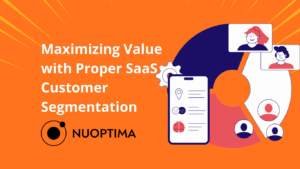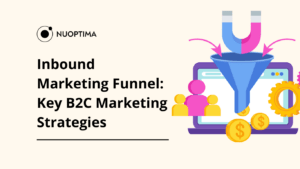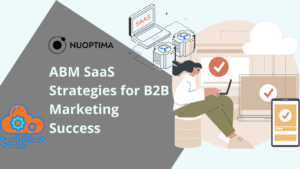We are all familiar with the affiliate marketing industry, especially in the fitness and ecommerce industry.
DIGIDAY[1] surveyed more than 100 brands and agencies on their affiliate marketing budgets and strategies, and they’ve concluded that 17% of them allocate 80 – 100% of their SaaS marketing budget to affiliate marketing.
SaaS brands have started to see the benefits of affiliate marketing in 2023, with the interest peaking in Q1 of 2024, according to Google Trends.
In this SaaS affiliate marketing guide, we will break down the benefits of this marketing activity with 4 proven strategies and best practices for SaaS companies.
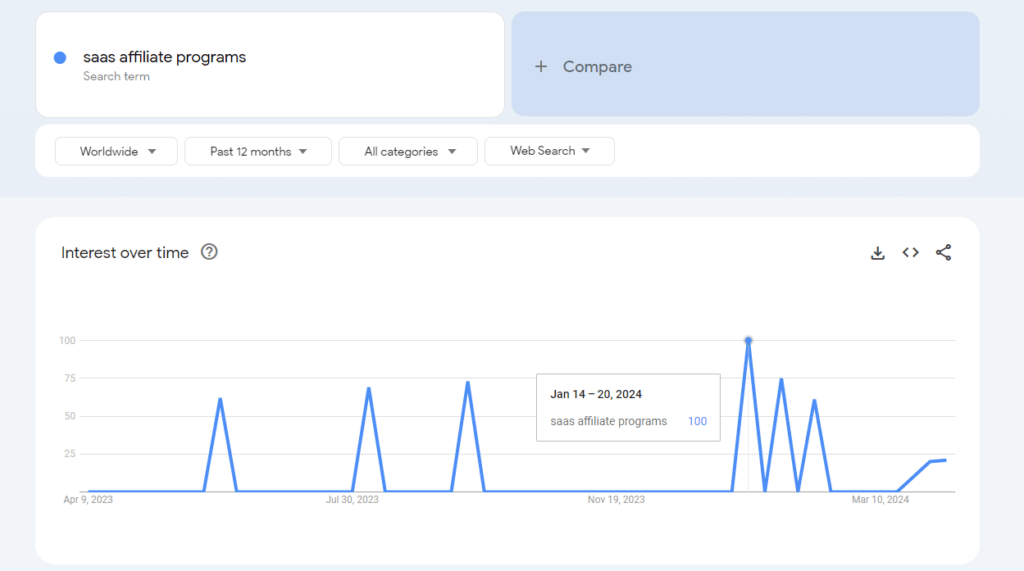
How Big Is the Potential of Affiliate Marketing for SaaS Companies
As we saw the spikes in the Google Trends screenshot above, we can conclude that the potential is high. SaaS brands like Easyship have already shown significant growth (312% more revenue through partnership programs) in this case study[2].
First things first, what is SaaS affiliate marketing?
SaaS affiliate marketing is a growth strategy where a SaaS company partners with affiliates (other best B2B SaaS companies or individuals) to promote their product for a commission on a specific action. These specific actions are usually sign-ups, leads, sales, or other actions from the affiliate’s referral.
Types of SaaS affiliate/referral partnerships
| Type | Explanation | Examples |
| Traditional | Businesses/Individuals promote your product to your audience and earn a commission from a sale | Adobe’s affiliate program |
| Commerce content | Content produced by publishers in the form of buyer guides, recommendations and comparisons. | Articles on Forbers or Wirecutter |
| Communities and groups | Partnerships with communities and groups. | Microsoft’s affiliate program |
| Brand ambassadors | Existing customers as brand ambassadors | Dropboxes’ referral program |
| SaaS educators | Educators and creators that make high-quality content on different SaaS solutions. | Pat Flynn and his Smart Passive Income website/podcast |
| Strategic partnerships | Partnership with other SaaS companies. | Shopify’s affiliate program |
| Integrations with other software | Being a part of another SaaS solution fully. | Hubspot and Canva |
Why should you do it?
SaaS affiliate marketing isn’t risky
SaaS affiliate marketing is very beneficial for brands that want to tap into a warmed-up audience that can potentially have an interest in their product. It is one of the low-risk and cost-effective marketing strategies because you only pay for actual sales and lead generation.
You are in front of your target audience
By expanding their market reach and visibility, SaaS brands are getting noticed by more and more people. This marketing strategy is good for building trust and authority in the niche because you get high-quality recommendations and backlinks that improve your SEO performance.
No large investements
Other marketing strategies for SaaS require resources. Whether a good budget – like PPC or human resources – like SaaS content marketing, there is an upfront cost.
With affiliate marketing, if you find the right partners and set up your strategy, you can try it out without any hidden costs. You will pay as you go in terms of your affiliates getting a commission every time they tick the box (generate sign-ups, leads, or purchases). Additionally, integrating ABM SaaS strategies can help you further target and engage high-value accounts, enhancing your marketing efforts.
Get Valuable Data
Affiliate marketing is a great field for experiments on what your target audience reacts to. If you try out different SaaS partnership strategies alongside SaaS affiliate marketing strategies (which we will outline below), you can easily measure the performance of each strategy and campaign.
If we’ve convinced you to give affiliate marketing for the SaaS industry a try, let’s see which strategies you can use.
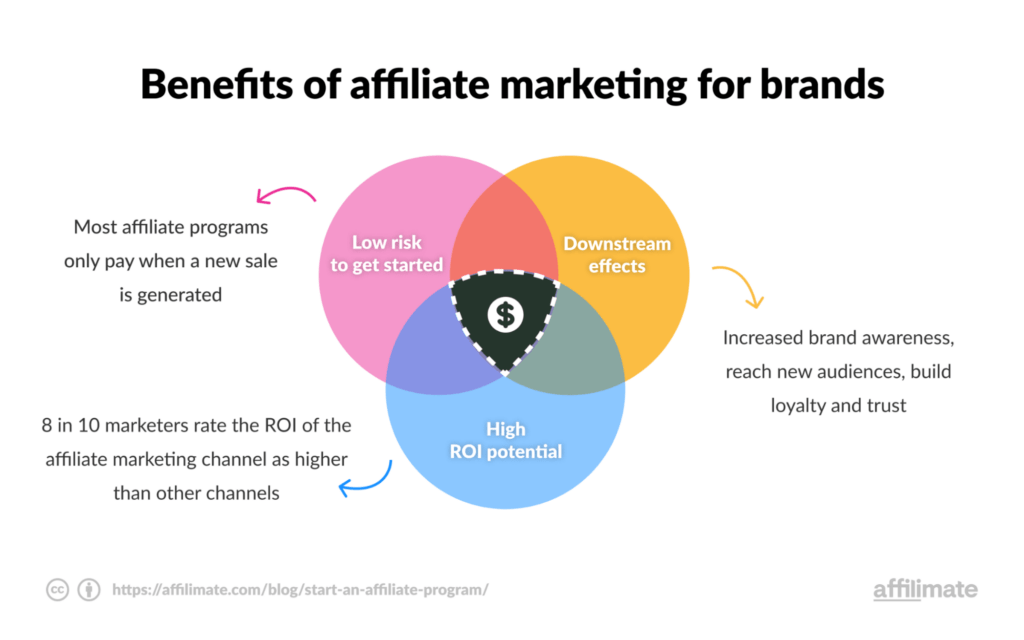
4 Best Strategies for SaaS Affiliate Marketing
The four best strategies for SaaS affiliate marketing from our SaaS marketing playbook are:
- Content marketing
- Social media
- Email marketing
Let’s break down into details each strategy:
1. Content marketing
Content marketing is a proven way affiliates can effectively market your product because SaaS buyers are usually looking for informative articles, detailed comparisons and real-life experiences to see if the software is useful to them.
An affiliate could write an in-depth blog post titled “10 Ways [ Your SaaS Product] Can Streamline Team Communication [ your main use case],” providing detailed insights into how the SaaS product improves efficiency and team communication.
We advise SaaS companies to have their own written guest posts because expert content writers will highlight all the important aspects of your tools without appearing “salesy.”
If your affiliate insists on writing the article themselves, make sure to provide a detailed content brief, brand voice, case studies or real-life scenarios.
Other types of content you can offer are:
- Product reviews and comparisons: direct comparison with a competitor or “an old way of achieving X.”
- Video tutorials and demos: live testing and demonstrating how to do [your main use case] with your product.
- Infographics: creating shareable infographics with key value propositions
- Eboks and guides: even more detailed

Best practices:
When you are “exploiting” someone else’s audience, there is a thin line between “you overshadowing the affiliate” and “the affiliate overshadowing you.” Keep in mind that the audience trusts the affiliate and is used to their messaging.
When picking your affiliate, make sure that their target audience and personal brand are aligned with your company’s tone, values and messaging. Incorporate your own brand voice in the marketing materials, but don’t take over the affiliate’s space since the audience trusts them and will likely convert to their honest recommendation.
Don’t ask the affiliate to be too salesy about your product because the audience will tell you that this is a paid collaboration. Highlighting the benefits and use cases of your SaaS will be enough to convince the right target audience to convert.
Keep in mind that conversions often won’t happen fast. With ecommerce products, the value is seen instantly, so it is easier for the audience to make a purchase. With SaaS brands, that is not the case – the audience needs more convincing (more value and multiple different angles).

2. Social media
According to Customer Think[3], 67% of affiliate marketers connect with their audience through social media. Based on our experience with dozens of SaaS product marketing brands, the ones that have a straightforward product or an alternative to a popular product (for example, a Slack alternative) social media is one of the best affiliate marketing strategies. It’s also important to note that much of this engagement happens through dark social channels—such as private messaging apps and email—where traditional tracking tools might not capture the full extent of the interaction.
Affiliate marketers who have an audience of tech enthusiasts, company workers, or marketers will have a high success rate in promoting SaaS products, especially micro SaaS solutions that target specific niche problems.. This can be done through:
- Instagram stories: Sharing “real-time” tips and showing how to use the product quickly and efficiently.
- Twitter threads: A Twitter thread explaining a problem many in your niche face and how the SaaS product solves this issue, step by step. Conclude the thread with a call to action (CTA) to learn more through an affiliate link.
- YouTube video reviews/tutorials: Longer and more detailed how-to or product demo videos with a focus on the problem the SaaS product is solving and its applications.
- TikTok videos/Instagram reels: Quick teasers that would catch the attention of viewers and direct them to the landing page where they can find out more about the SaaS product.

Best practices
Use affiliate marketers on social media for quicker brand awareness and direct the many prospects to SaaS landing pages where they can find out more. Detailed guides and case studies don’t usually go well on social media. Instead, interesting teasers, quick summaries and direct use case representation can have an effect.
Visuals are very important for social media. Make sure you have high-quality videos, product demos, and images to share with your affiliates.
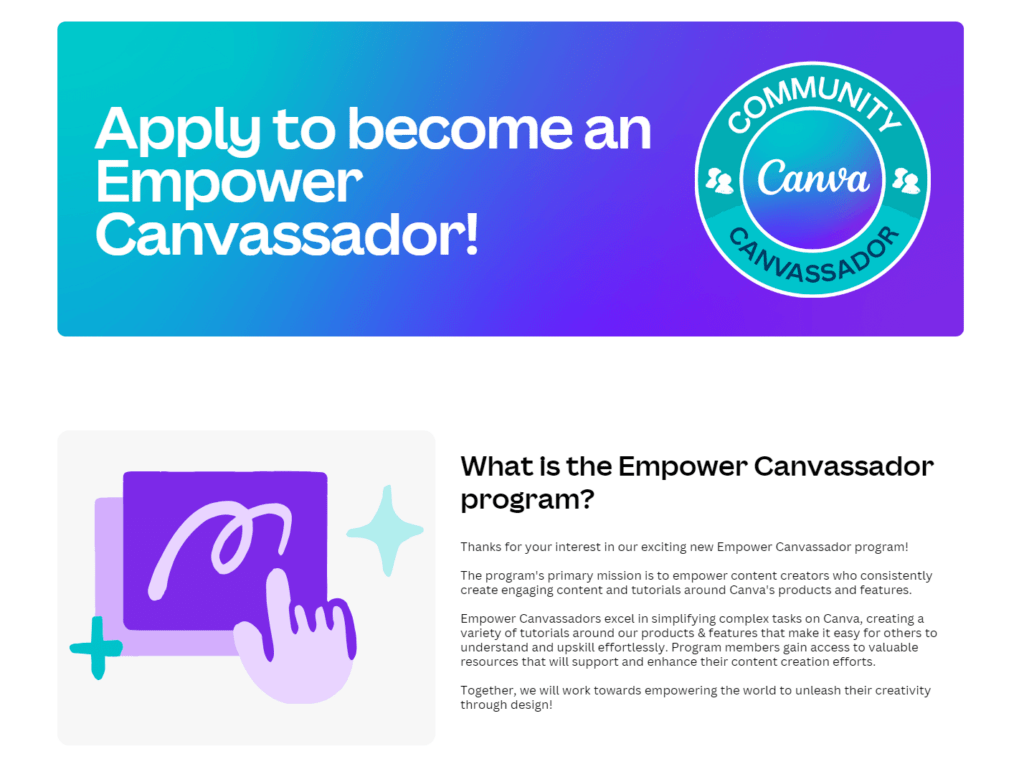
3. Email marketing
Unlike social media, when someone is your newsletter subscriber – they are giving you much more of their time. It is one of the top SaaS customer retention strategies. Therefore, here are some of the ways you can promote your product through affiliates with a good email marketing platform and strategy.
- An educational sequence – A number of emails that educate the audience about a certain problem and show your SaaS product as a solution
- Email course – A more detailed version of an educational sequence
- Success stories segment – An affiliate email marketer could dedicate a segment of their newsletter to “success stories,” where they would show use cases and real-life examples of people/companies successfully using your product.
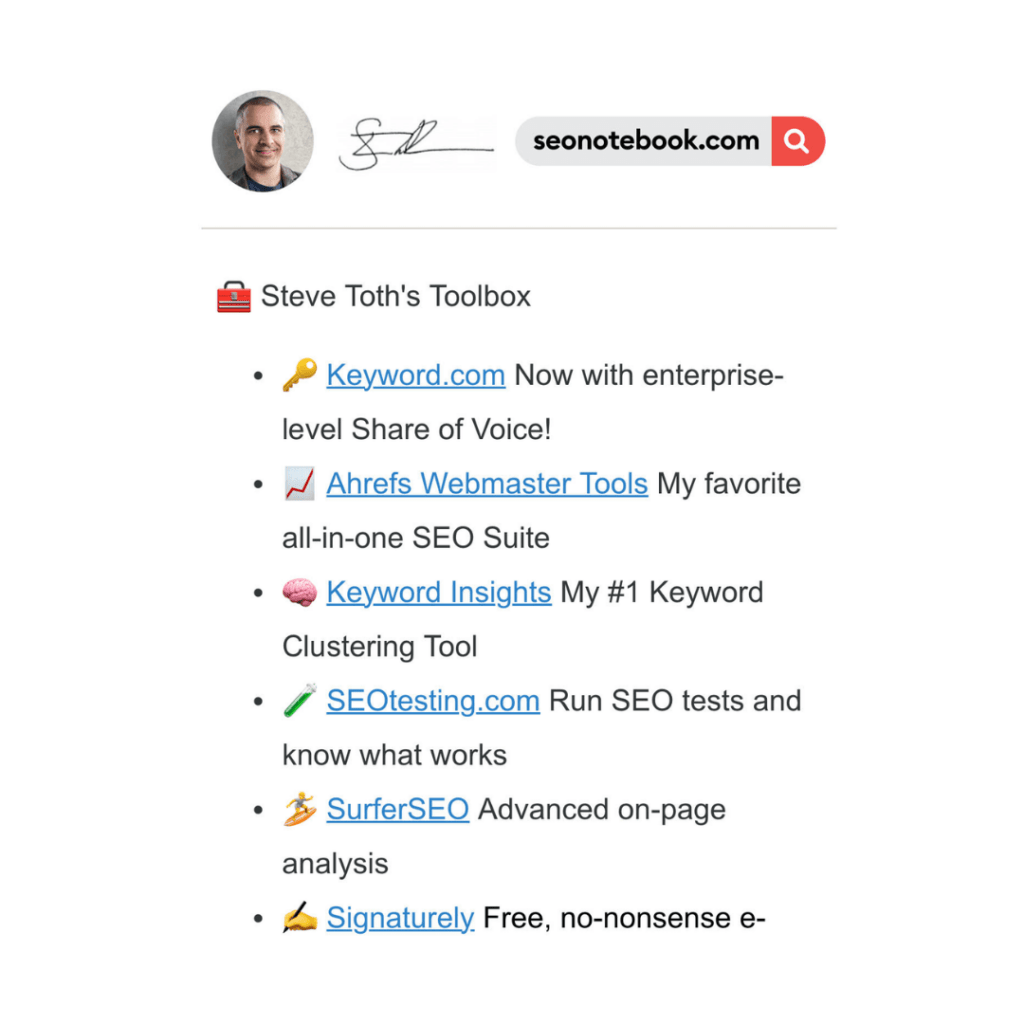
Best practices
Make sure the referral link is quick and easy to find but don’t let your story be the only “goal” behind the newsletter. People who read emails like to read more than average social media users, so this is a good chance to get more details.
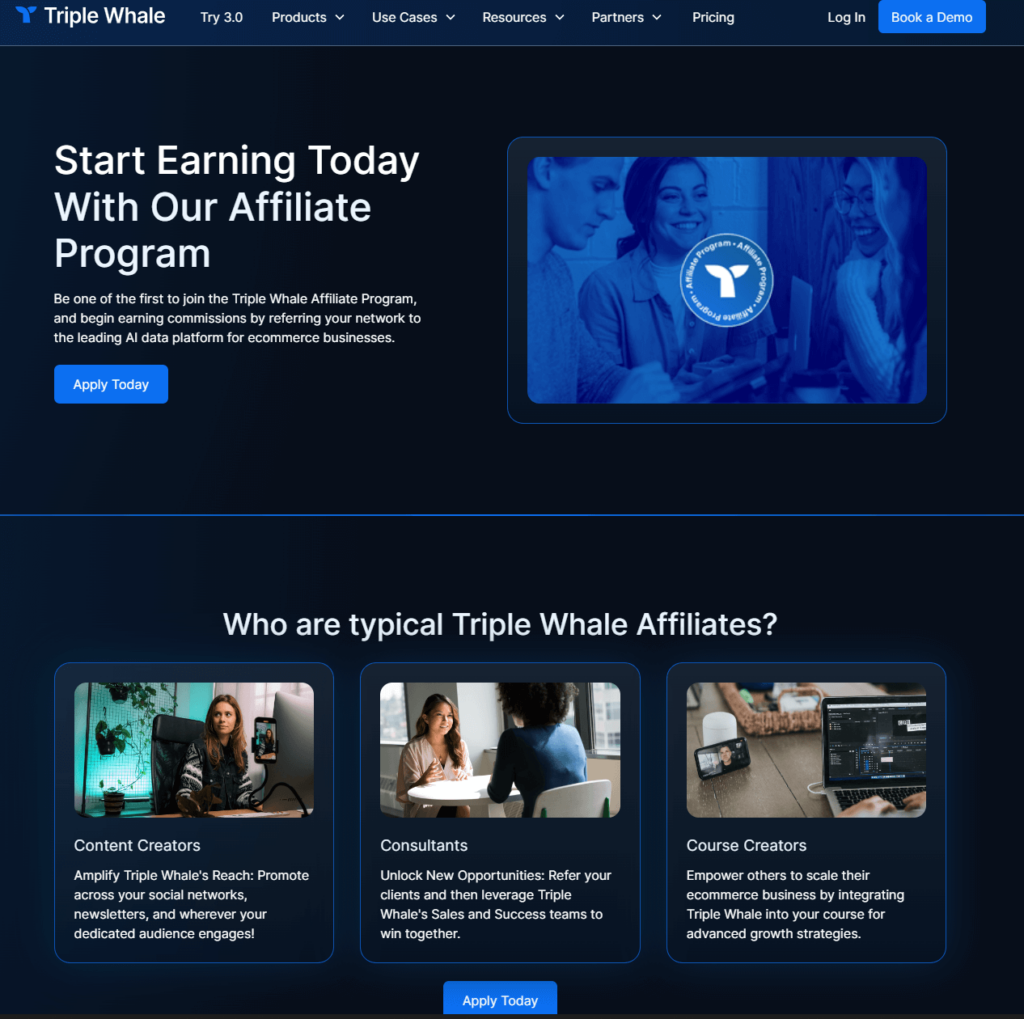
4. Webinars/Podcasts
A final affiliate marketing strategy requires you to have affiliates that host webinars or podcasts. They can promote your product on their own, or you can co-host it and share your thoughts.
If their audience is unfamiliar with the product, leave it to the host to highlight the important aspects in a natural way.
A Q&A interview with the product team is a great way to sell to an audience that is already familiar with your product.
Provide exclusive deals, discounts, or bonuses for attendees who sign up or purchase during or right after the webinar or podcast. This creates urgency and incentivizes immediate action.
Give the hosts all necessary materials, such as product demos, walkthroughs, and FAQs, to address any questions that might arise during the webinar or podcast.
How To Set Up Your SaaS Affiliate Marketing Strategy
No matter the affiliate marketing strategies you choose, we will outline the universal steps you should take to set up any affiliate marketing strategy for SaaS.
Set up your affiliate tracking system
While you could manage an affiliate program without specialized software, doing so efficiently as you scale becomes nearly impossible. Mainly because manual tracking poses a greater risk for errors and lacks real-time insights that your affiliates will most likely require.
Therefore, if you want to be time and cost-effective, it is best to use an affiliate tracking system.
Any affiliate tracking system will require you to set up a tracking code for your site so the software can note down when an affiliate refers a visitor. Once the code is set up, your affiliates should receive their own dashboards with unique affiliate links plus marketing materials.
How does tracking work?
The affiliate shares the unique affiliate link with their audience, and when someone clicks on it, a cookie is placed on their browsers. If the customer makes a purchase, the sales get attributed to the affiliate.
Within the affiliate tracking software you can view their dashboards and set up different commission rates and payouts.
Design a SaaS commission model
The first thing any affiliate marketer would want to know is – How much $ do they get?
Therefore, you should prepare your SaaS commission model in advance. Here are the most popular commission structures:
| Type | Explanation | Pros |
| Flat rate | Fixed amount for every sign-up or sale | Simple and easy |
| Percentage of sale | A percentage of the sale amount | Great for promoting high-priced pricing plans |
| Recurring | A percentage of recurring payments | Great for LTV |
| Tiered | Commission rates increase after certain milestones | Great for long-term partnerships |
The commission model will highly depend on your SaaS, pricing model and affiliate marketing goals. Apart from making a commission model, you need to create the terms and conditions.
For example,
- Commissions are paid after a 30-day refund period.
- Recurring commissions are only paid for active subscriptions.
- Bonuses are calculated monthly and paid in the following month.
This will ensure everyone is on the same page and no frequently asked questions or issues pop up. For those looking to delve deeper into affiliate marketing and other growth strategies, exploring our recommended SaaS books can provide valuable insights and enhance your understanding.
Make a compelling sign-up page
If you want to automate the hiring process for new affiliates or want to scale at some point, you should consider having a dedicated sign-up page.
Your sign-up page should include:
- Clear value proposition
- Headline
- Detailed commission structure
- Rules
- Testimonials and examples
- FAQs
- Call to actions
- Contact information
The Hubspot affiliate partners page is a great example of a sign up page that is clear and has all the information you need.
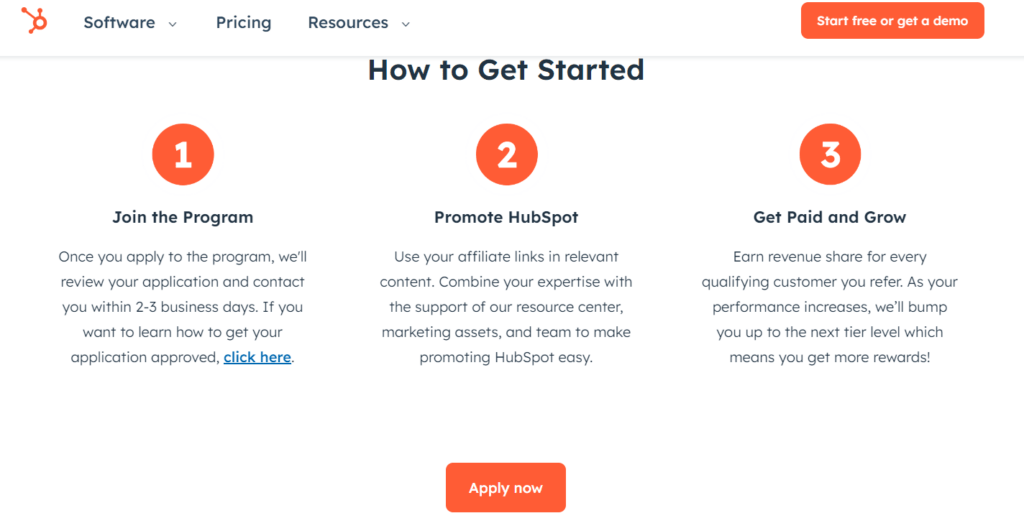
Design tips
For the best user experience, make sure to have a clean, simple design with a fast loading time and high responsiveness on mobile devices. Banners and infographics can break up the text visually and ensure the information on the sign-up page is presented clearly.
Distribute marketing materials
Once you’ve approved your affiliate partners, you should share your strategy and marketing materials. Depending on your strategy, you can create a library of ready-to-use promotional materials. This can include banners, display ads, email templates, social media post drafts, product images, demo videos, FAQs, case studies or feature sheets.
Keep materials updated and track how and when your partners are using them to see if you need to optimize or replace them.
Promote your affiliate program and recruiting affiliates
At first, finding affiliate partners can be a bit time-consuming, especially if you are doing outreach. However you can promote your sign-up page in various ways, such as:
- Dedicated blog posts
- Footer/Header links on your website
- Newsletters
- Social media promotions
- Forum and community posts
- Guest blogging
- PPC SaaS marketing campaigns
Monitor and optimize the program
Once your SaaS affiliate marketing strategy is up and running, you should focus on setting clear KPIs and optimizing based on data. Here are the main KPIs you should track:
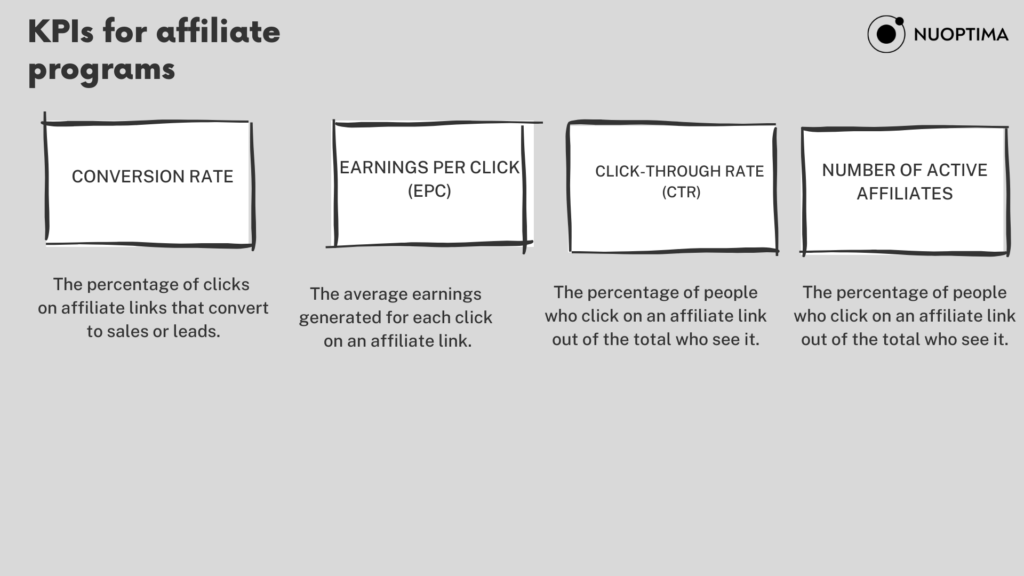
You should also regularly check your affiliate dashboards, get feedback from your affiliates and reward/ support over/underperformers.
Keep your marketing materials and product news fresh and up-to-date. This includes promotional banners, landing pages, and product images or videos.
For expert advice on optimizing SaaS operations, check out the Nuoptima SaaS Podcast featuring Rob Smith from Slick.
Conclusion
The road from choosing your affiliate marketing strategy, and SaaS affiliate program to working with affiliates and optimizing your results is long and hard.
At NUOPTIMA, we understand the potential and specific details of SaaS affiliate marketing. Our team has created dozens of SaaS affiliate programs.
We offer a full-service package, from strategic planning and partner recruitment to performance tracking and optimization. Plus, our approach is data-driven and results-oriented, ensuring that your affiliate program lives up to your expectations and becomes one of your best marketing assets.
Interested? Book a call today and discover how we can help elevate your affiliate marketing efforts for your SaaS business.
FAQ
You can promote your SaaS product to affiliate marketers by creating a special SaaS affiliate partnership landing page and sharing it with your audience through content marketing, newsletters, and PPC campaigns. You can also access affiliate marketing groups and communities or do manual outreach.
The commission will vary depending on the model you choose. Models range from flat rates to tiered pricing. In this article, we covered the most popular commission models that you should consider.
You can find affiliates in special affiliate communities and groups or by doing manual outreach if you have a specific group or person you want to partner with.
The commission percentage for SaaS affiliates varies but typically ranges from 15% to 30% of the subscription value. [4] Some programs may offer higher rates or even recurring commissions based on the customer’s lifetime value.
References
- https://digiday.com/form/report-the-state-of-affiliate-and-partner-marketing/[1]
- https://go.impact.com/rs/280-XQP-994/images/CSdownload-PC-EV-Easyship.pdf[2]
- https://customerthink.com/5-creative-ways-to-earn-more-from-affiliate-marketing-using-social-media/#:~:text=67%25%20of%20affiliate%20marketers%20connect%20now%20with%20customers%20on%20social%20media.[3]

